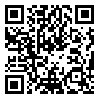Volume 16, Issue 57 (4-2022)
MLJ 2022, 16(57): 525-540 |
Back to browse issues page
Download citation:
BibTeX | RIS | EndNote | Medlars | ProCite | Reference Manager | RefWorks
Send citation to:



BibTeX | RIS | EndNote | Medlars | ProCite | Reference Manager | RefWorks
Send citation to:
Rezaei E, Rostami Ghafas Abadi A. Monopoly on Forbidden Treatment Despite the Alternative of Halal from the Perspective of Shia and Sunni Jurists. MLJ 2022; 16 (57) :525-540
URL: http://ijmedicallaw.ir/article-1-1463-en.html
URL: http://ijmedicallaw.ir/article-1-1463-en.html
1- Department of Jurisprudence and Principles of Islamic Law, Faculty of Theology and Islamic Knowledge, University of Qom, Qom, Iran
Abstract:
Background and Aim: The issue of treatment of haram is one of the important medical issues that need to be studied from a jurisprudential point of view. Homosexual and ... deals with haram treatment. Shiite and Sunni jurists in case of emergency, the legitimacy of haram treatment is subject to the monopoly of treatment to haram; The monopoly of treatment is also realized if it is not prescribed and in case of treatment with halal, it is forbidden to eliminate any necessity with haram. The existence of mandoheh is discussed.me, Yabad. The presence of the mandouha has become very intense.
Method: This research has been done in a library and descriptive-analytical manner using Shiite and Sunni jurisprudential books.
Ethical Considerations: In all stages of writing, while respecting the originality of the texts, honesty and trustworthiness have been observed.
Results: In connection with the jurisprudential ruling of monopolizing treatment to haram, sometimes the monopoly of treatment is conceivable if it is not included and knowledge of haram treatment, which is also the case with all Shiite and Sunni jurists. Existence of incontinence and difficulty in accessing the solvent, Existence of incontinence and inconvenience in using halal medicine, Existence of incontinence and urgency to a certain type of treatment due to fear of danger to life, organ failure or any unbearable harm is conceivable.
Conclusion: If the treatment of the patient in spite of the cause, for some reason causes hardship or causes any irreparable damage; Halal is presumed to be "absence"; according to the rule of urgency, the treatment of the patient is considered to be limited to haram medicine, and the condition of non-compliance is also fulfilled in this case.
Please cite this article as:
Rezaei E, Rostami Ghafas Abadi AR. Monopoly on Forbidden Treatment Despite the Alternative of Halal from the Perspective of Shia and Sunni Jurists. Medical Law Journal. 2022; 16(57): e40.
Method: This research has been done in a library and descriptive-analytical manner using Shiite and Sunni jurisprudential books.
Ethical Considerations: In all stages of writing, while respecting the originality of the texts, honesty and trustworthiness have been observed.
Results: In connection with the jurisprudential ruling of monopolizing treatment to haram, sometimes the monopoly of treatment is conceivable if it is not included and knowledge of haram treatment, which is also the case with all Shiite and Sunni jurists. Existence of incontinence and difficulty in accessing the solvent, Existence of incontinence and inconvenience in using halal medicine, Existence of incontinence and urgency to a certain type of treatment due to fear of danger to life, organ failure or any unbearable harm is conceivable.
Conclusion: If the treatment of the patient in spite of the cause, for some reason causes hardship or causes any irreparable damage; Halal is presumed to be "absence"; according to the rule of urgency, the treatment of the patient is considered to be limited to haram medicine, and the condition of non-compliance is also fulfilled in this case.
Please cite this article as:
Rezaei E, Rostami Ghafas Abadi AR. Monopoly on Forbidden Treatment Despite the Alternative of Halal from the Perspective of Shia and Sunni Jurists. Medical Law Journal. 2022; 16(57): e40.
Type of Study: Original Article |
Received: 2021/11/17 | Accepted: 2022/04/13
Received: 2021/11/17 | Accepted: 2022/04/13
Send email to the article author
| Rights and permissions | |
 |
This work is licensed under a Creative Commons Attribution-NonCommercial 4.0 International License. |






